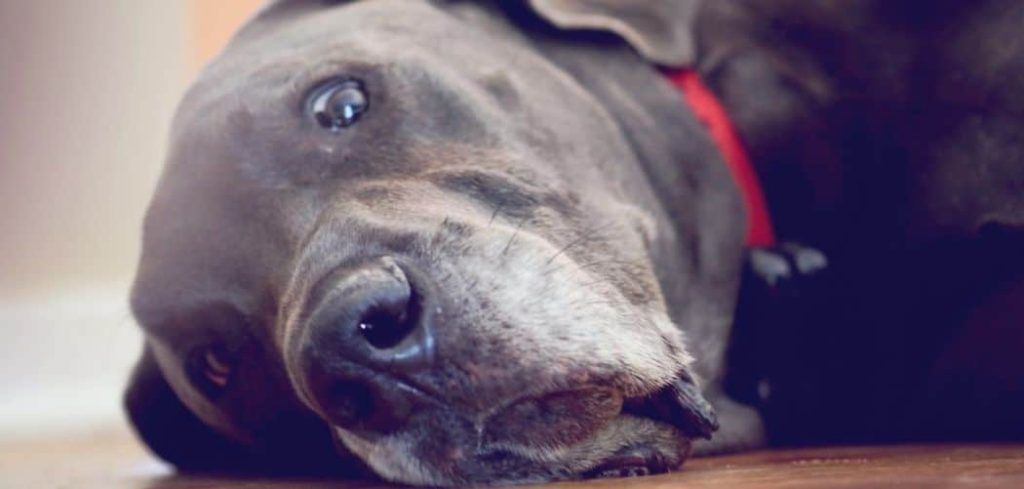When your dog is suddenly sleeping all day and refusing to eat, it can be incredibly alarming. These changes in behavior may signal a range of issues from minor illness to serious health concerns.
We outline the common reasons why your dog sleeps all day and does not eat, what you can do at home, and when to seek veterinary help.
Dog Sleeping All Day and Not Eating — Why It Happens
Lethargy combined with a lack of appetite in dogs is often a red flag that something isn’t right. From viral infections to pain, digestive upset, or even emotional distress, many factors can cause your dog to appear unusually tired and uninterested in food.
Some cases may stem from short-term fatigue or weather changes, while others point to more serious underlying health problems such as organ dysfunction or systemic infection. Hormonal shifts, medications, or age-related decline can also play a role.

Dog Been Sleeping All Day and Not Eating: Common Causes
Viral or Bacterial Infections
Infections like parvovirus, distemper, or leptospirosis can leave a dog feeling extremely tired and unwilling to eat.
Even less severe illnesses like kennel cough or a gastrointestinal bug can drain your dog’s energy and appetite.
You may notice other symptoms such as vomiting, diarrhea, nasal discharge, or a fever.
Infections can become serious quickly, especially in puppies or older dogs, and should never be ignored.
Read more: Dog Diarrhea and Not Eating (When to worry)
Pain or Injury
Dogs that are in pain from an internal injury, dental issue, or orthopedic problem may lie around more and lose interest in food. Since dogs are good at hiding discomfort, the only outward signs might be excessive sleeping and skipped meals.
Limping, sensitivity to touch, whimpering, or restlessness at night may also accompany the behavior.
Digestive Upset
If your dog has an upset stomach—whether from eating something off the ground, food sensitivity, or a mild gastrointestinal infection—they may simply not feel up to eating or moving much.
Mild digestive problems may pass on their own, but persistent vomiting, diarrhea, or bloating calls for vet attention.
Chronic Conditions (Kidney Disease, Liver Disease, Diabetes)
Long-term health problems like kidney disease, liver dysfunction, or diabetes often begin with subtle symptoms, including increased lethargy and poor appetite.
As these diseases progress, your dog may also develop bad breath, increased thirst, weight loss, or changes in urination. Catching chronic illnesses early can make a big difference in treatment options.
Side Effects from Medication or Vaccination
Sometimes dogs feel a little “off” after starting a new medication or getting a vaccine. Lethargy and appetite loss are known side effects of certain antibiotics, painkillers, or flea/tick preventatives.
These effects are usually temporary, but if they persist beyond a day or two, your vet may need to adjust the dosage or try a different option.
Emotional Stress or Depression
Dogs that are grieving a loss, experiencing anxiety, or dealing with changes in their environment can become withdrawn and lose interest in food or play.
A major move, a new family member, or being left alone more often can trigger these symptoms. Behavior changes due to emotional reasons usually resolve with time, routine, and reassurance, but some cases may benefit from professional support.
What to Do If Your Dog Has Been Sleeping All Day and Not Eating
Start by checking for any additional symptoms like vomiting, diarrhea, coughing, or signs of pain. If your dog is otherwise acting normal and this behavior has only lasted a day, it may be a temporary issue.
Keep your dog hydrated and offer bland food such as boiled chicken and rice to tempt them.
Provide a quiet, comfortable place for them to rest and observe them closely for any changes.
You can also check their gums for color and moisture—pale or tacky gums may indicate a serious issue.
Try gently coaxing them to walk or interact to see if they respond normally.
Avoid giving treats, table scraps, or new foods during this time. Stick to their regular diet and routine as much as possible to minimize stress.
When to Call or Visit Your Vet
Call your veterinarian if your dog:
Has been lethargic and not eating for more than 24–36 hours
Is vomiting, has diarrhea, or shows signs of pain
Has pale gums or labored breathing
Is very young, very old, or has an existing health condition
Suddenly collapses or cannot stand up
Even if symptoms seem mild, a vet exam can rule out more serious issues and provide peace of mind.
Read more: My Dog Has Upset Stomach and Not Eating (How to help)
Key Takeaway
If your dog has been sleeping all day and not eating, don’t ignore it. These symptoms are your dog’s way of signaling that something might be wrong.
Some cases may resolve on their own with rest and hydration, but others point to underlying medical or emotional issues that need prompt care. Trust your instincts and reach out to your vet if you’re concerned—early attention can make all the difference.
